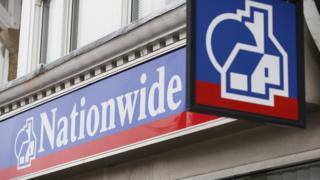Nationwide caps mortgage lending due to virus
 Image copyright PA Media
Image copyright PA Media The UK’s biggest building society has tripled the minimum deposit it will ask for from first-time buyers.
The Nationwide will lower its ceiling for mortgage lending to new customers in response to the coronavirus crisis.
It said the change, from Thursday, was due to «these unprecedented times and an uncertain mortgage market».
First-time buyers are likely to be the most significantly affected because they often have smaller amounts saved to get on the property ladder.
Nationwide has reduced the proportion of a home’s value that is willing to lend from 95% to 85%.
So for example, if a property costs £100,000, a new buyer would now need a £15,000 deposit rather than a £5,000 deposit.
Nationwide made the move in case house prices fall and buyers go into negative equity – that is when the debt is greater than the value of the property.
But it was also to cut the risk of customers not being able to make repayments if they lose their jobs.
«Our priority at this time must be to help members keep their homes. As such, we need to ensure our members can afford their repayments, while doing what we can to protect them from falling into negative equity,» said Henry Jordan, Nationwide director of mortgages.
After the elation over the re-opening of the housing market, Nationwide’s move to limit how much we can borrow will bring everyone down to earth.
If there is a downward lurch in house prices, recent buyers with big loans will be in serious danger of slipping into negative equity.
Anyone who has been there in previous recessions will tell you it is stressful experience, and not just because of the usual worry about meeting the monthly payments.
You can feel trapped, because if you sell you make a loss. Plus, there is virtually no prospect of getting another loan to move up the ladder.
Of course, people who are priced out the market will welcome cheaper property, if that is what happens.
But Nationwide is saying that it is time to «protect» us from risking too much to get a dream home.
David Hollingworth, associate director of communications at L&C Mortgages, said that Nationwide was following many other major UK mortgage lenders.
«The market has been changing quickly,» he said. When the lockdown started, many institutions dramatically dropped the percentage of a property’s price they were willing to lend: this is known as the loan-to-value ratio.
As the housing market has reopened, those maximum loan-to-value ceilings have been rising again, but not up to Nationwide’s previous level of 95%.
In a sense, Nationwide is now «running with the rest of the pack», Mr Hollingworth said.
‘Hard to borrow’
Some lenders, such as HSBC, still have mortgages with a 90% loan-to-value ratio.
However, there is more demand for that type of mortgage than many banks have the capacity to deal with at the moment, he said.
Emma Harvey, mortgages director at MoneySuperMarket, said: «It’s getting harder to borrow money to buy a house, as providers look to limit risk in these uncertain times, and Nationwide is the latest example of this.
«In addition, there are also fewer mortgage products out there to choose from. For example, whilst 90% [loan-to-value] mortgages were commonplace at the start of 2020, only a handful of lenders are still offering these, and even then only with restrictions.»
Ms Harvey said that it has always been a good idea to have as large a deposit as you can save.
«If you’re looking to get on the housing market, you should review your finances, look for areas of savings and be realistic about when you will be in a position to purchase a property.
«But with the Bank of England base rate so low, there are some great deals out there at the moment for people with a healthy deposit,» she added.


